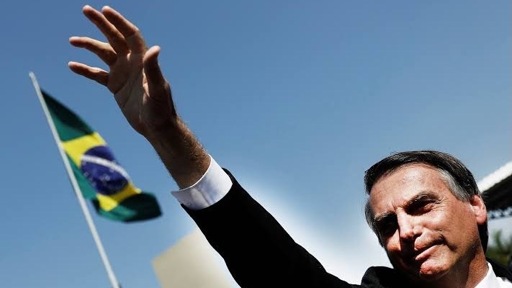Former president Jair Bolsonaro was arrested on Saturday morning, November 22, by the Federal Police (PF). In a statement, the PF reported that it carried out “a preventive arrest warrant in compliance with a decision from the Supreme Federal Court.”
Under house arrest since August 4, Bolsonaro of the Liberal Party (PL) was taken to the PF Headquarters after being detained at his home around 6 am in Brasília.
According to authorities, Saturday’s detention is a precautionary measure and does not constitute the beginning of his 27-year and three-month sentence for which the far-right former president was convicted in the coup plot trial.
In the decision, STF Minister Alexandre de Moraes states that the preventive arrest request was motivated by a call for an event – called a “vigil” – made by Flávio Bolsonaro, which would occur in front of the former president’s residence. Additionally, according to Moraes, Bolsonaro attempted to break his ankle monitor.
“[There was an] occurrence of violation of the defendant’s electronic monitoring equipment […] at 12:08 am on 11/22/2025,” which would have aimed to “ensure successful escape, facilitated by the confusion caused by the demonstration called by his son.”
The call cited by Moraes was spread on Friday, November 21, by Flávio in a video on his social media, calling supporters to gather on Saturday at 7 PM in front of the condominium where Bolsonaro lives. In the message, the senator says the country would be in the hands of “bandits” and “dictators.”
Indicating flight risk, Moraes recalled that Bolsonaro “planned, during the investigation that later resulted in his conviction, to flee to the Argentine embassy through a request for political asylum to that country.”
The case against Bolsonaro
Considered the leader of the coup plot that attempted to break the democratic rule of law on January 8, 2023, the case against Bolsonaro in the courts dates back years, at least since 2021.
According to the accusation presented by the Attorney General’s Office (PGR), then-president Jair Bolsonaro began his series of attacks on electronic voting machines and the Brazilian electoral system on March 8, 2021, when Luiz Inácio Lula da Silva (PT) regained his political rights after the annulment of the “Operation Car Wash” trials by the Supreme Federal Court.
The PGR highlights that in mid-2021, Bolsonaro conducted a live broadcast from the presidential residence, where he questioned the security of the electronic voting system. For the prosecution, this live stream signaled the beginning of a campaign to disqualify the Electoral Justice.
That same year, during the September 7 celebrations, the then-president of the Republic went so far as to publicly declare that he would not comply with decisions issued by the Supreme Court.
2022: Desperation sets in
On July 5, 2022, the government’s actions against institutions began a new chapter with a ministerial meeting focused on electoral debate. The audiovisual recording of this meeting was later recovered from equipment belonging to an aide close to the former president.
In the meeting, the then-president urged his ministers to react to an unfavorable scenario in electoral polls.
“Everyone here has intelligence well above average. Everyone here, like everyone out there, has something to lose. We cannot, folks, let the elections arrive and allow what’s being painted to happen, what’s being painted. […] We’re going to have to do something beforehand,” said the former president to his team, even mentioning a “plan B.”
“The picture that’s painted on October 2 is over, damn it! Want it any clearer than that? We’re doing the right thing, but plan B has to be put into practice now,” stated Bolsonaro.
At another point in the same meeting, General Augusto Heleno, then head of the Institutional Security Cabinet (GSI), went so far as to speak of “flipping the table.”
Read more: Fear and misinformation dominate discourses of Brazilian right
“There won’t be a VAR review. So, whatever has to be done has to be done before the elections. If we have to pound the table, it’s before the elections. If we have to flip the table, it’s before the elections,” stated Heleno.
Shortly after, on July 18, Bolsonaro received representatives from foreign nations at the Alvorada Palace, where he again raised suspicions about the integrity of the electoral system. The Public Ministry interpreted the meeting as an attempt to seek international endorsement for a potential institutional rupture.
Watch: Gilmar Mauro: “Defeating neo-fascism in Brazil is fundamental”
Electoral defeat
During the second round of presidential elections in October 2022, the Federal Highway Police (PRF) conducted operations in areas where candidate Lula obtained significant votes in the first round. At the time, the TSE summoned the then-director general of the PF, Silvinei Vasques, and ordered an end to the blockades. Although the Electoral Justice ensured that no one was prevented from voting, the actions generated strong criticism and were subject to investigation.
After the defeat at the polls, groups of supporters of the former president set up camps in front of Army barracks, calling for military intervention, while the former president remained secluded, without publicly recognizing the victory at the polls, until the eve of the inauguration of the elected president and vice-president, Lula and Geraldo Alckmin (PSB), when Bolsonaro left Brazil for the United States.
Watch: Bolsonaro supporters refuse to accept election results
2022-2023: The “secret plan”
At the end of 2022, the Federal Police identified a project called “Green and Yellow Dagger.” Attributed to General Mário Fernandes, the document contained drastic proposals, such as annulling the electoral result, arresting opponents, and even plans to assassinate elected authorities and the then-president of the Superior Electoral Court (TSE), Minister Alexandre de Moraes.
The crisis reached its peak on January 8, 2023, with the invasion and destruction of the headquarters of the Three Powers in Brasília. More than 1,500 people were detained in the following days, accused of crimes such as damage to public property and attempted abolition of the Democratic State.
In September 2023, former aide-de-camp to Jair Bolsonaro, Lieutenant Colonel Mauro Cid, signed a plea bargain agreement, revealing to authorities details of crimes committed by Bolsonaro and other former members of his government.
2024-2025: Sanctions and beginning of criminal proceedings
The first judicial sanction against the former president came on June 30, 2023, when the TSE declared him ineligible for a period of eight years, due to misuse of media during the meeting with ambassadors at the Alvorada Palace.
Read more: Will Bolsonaro be brought to justice for his role in the January 8 coup attempt?
Meanwhile, the criminal investigation advanced and in November 2024, the Federal Police formally accused Bolsonaro of an attempted coup. In February 2025, the PGR forwarded the accusation to the Supreme Court, charging the former president with leading an armed criminal organization that allegedly attacked the constitutional order. In March 2025, the First Panel of the STF collegiate made him a defendant in Criminal Case 2668.
Between May and August 2025, the case took on an international dimension when one of the former president’s sons, federal deputy Eduardo Bolsonaro (PL-SP), sought support in the United States for sanctions to be imposed on Brazilian authorities, alleging political persecution.
In response to this context, the STF reporting minister imposed severe restrictive measures on the former president, which included house arrest, contact limitations, passport retention, and prohibition from using digital platforms. The measures were intensified after a series of violations.
Conviction
The final trial of the criminal case occurred in September 2025, when, by 4 votes to 1, the First Panel of the STF convicted Jair Bolsonaro to 27 years and 3 months in prison, to be served in a closed regime, for the crimes of armed criminal organization, violent attempt to abolish the democratic rule of law, coup d’état, damage against Union property, and deterioration of protected heritage.
Besides the former president, seven other people were convicted, accused of belonging to the “crucial nucleus” of the coup plot: federal deputy and former director-general of the Brazilian Intelligence Agency Alexandre Ramagem (of Bolsonaro’s PL), former Navy commander Almir Garnier, Bolsonaro’s former Justice Minister Anderson Torres, General Augusto Heleno, former minister of the Institutional Security Cabinet (GSI), Paulo Sérgio Nogueira, former Defense Minister, and General Walter Souza Braga Netto, former Chief of Staff Minister and candidate on the defeated ticket in 2022. The sentences for the eight defendants range from 16 to 27 years, according to each one’s level of involvement.
First published in Portuguese at Brasil de Fato.
The post Bolsonaro arrested and in preventative detention months after conviction for coup attempt appeared first on Peoples Dispatch.
From Peoples Dispatch via this RSS feed
So I’m guessing the Brazilians haven’t really been impressed by Trump’s fascist tariff tantrum?



